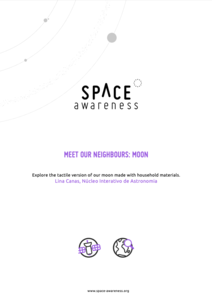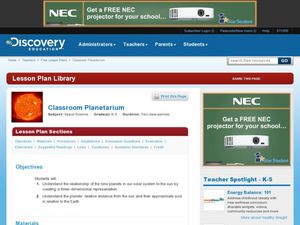Space Awareness
Meet Our Neighbors: Moon
Since a field trip to the moon isn't possible, bring the moon to young astronomers! Participants use everyday materials to create models of the moon and represent the features on its surface. The materials serve as a tactile as well as a...
University of Colorado
Modeling Sizes of Planets
The density of the huge planet of Saturn is 0.7 g/cm3, which means it could float in water! In the second part of 22, science pupils explore the size and order of the planets. They then calculate weight and/or gravity and density of...
Laboratory for Atmospheric and Space Physics
Jupiter’s Relative Size
How do you properly illustrate the extreme size difference between two planets—Earth and Jupiter? With the help of jellybeans, of course! Create a scale model of Jupiter's mass compared to Earth using a fishbowl, 1,400 beans, and a dixie...
University of Colorado
Looking Inside Planets
Researchers use scientific data to understand what is inside each of the planets. The first in a series of six, this instructional activity builds off of that concept by having pupils use a data table to create their own scale models of...
Curated OER
On Jupiter
Students tour Jupiter. In this scenario based lesson, students examine the size of Jupiter and make models of the other planets in the solar system to show how large Jupiter is compared to the other planets.
Curated OER
Planets in Balance
Students study the solar system by researching the planets. For this exploratory lesson students divide into teams and create mobiles.
Curated OER
Working on the Moon
Students take a mission to the moon. In this space science lesson, students visit selected websites to discover information about Earth's moon and the solar system. Students may take virtual missions to the moon and share information...
Curated OER
Earth
Fourth graders have a spatial awareness of the plants by orally discussing what they saw after they stepped out the model of the solar system. They recognize the similarities and differences between Earth and the other planets by being...
Curated OER
Astronomy
Middle schoolers brainstorm about what they know about the solar system. They study a planetary fact sheet and create a Venn Diagram with the information. They work in groups to examine the names of the planets and information regarding...
Curated OER
Make a Comet Model and Eat It!
Young scholars construct a comet model based on procedure provided. In this space science lesson, students compare the physical properties of comets to the models they made. They record their observations and share them with the class.
Curated OER
Strange New Planet
Students simulate different spacecraft missions using materials provided. In this space science instructional activity, students observe and record a planetary model's features from a distance. They relate this activity to scientists'...
Curated OER
A View Of Home From The Front Door and From Space
Students discover how distance can change how our view of an object. Students build a representative model of where their home is located from different distances. They create three drawn models of their home from various elevations as...
Curated OER
NASA's Mars gamble pays off
Students read an article about NASA and Mars and complete short answer questions about the article. In this Mars lesson plan, students also create a scale model of the solar system.
Space Awareness
Living in the Milky Way
Get to know our galaxy with an astronomy-themed, hands-on activity. Scholars watch an informative video, answer questions, and construct a model of the Milky Way in order to examine its contents and the distance inside it.
Space Awareness
Meet Our Neighbors: Sun
The sun isn't just a ball of yellow! Young scientists learn about the features of the sun using a hands-on modeling activity. They build models of the sun using common household items to represent sunspots, solar prominence, and the...
PBS
Why Isn't There an Eclipse Every Month?
Searching for an eclipse activity that sends scholars over the moon? Try an interesting interactive to get their minds active! The resource, part of an extensive Space series from PBS Learning Media, uses modeling and data analysis to...
University of Colorado
Spacecraft Speed
Space shuttles traveled around Earth at a speed of 17,500 miles per hour, way faster than trains, planes, or automobiles travel! In the 13th installment of 22, groups graph different speeds to show how quickly spacecraft move through...
Curated OER
Toilet Paper Solar System
Students create a model of the distances of the planets in the solar system using sheets of toilet paper and markers. Generally accepted orbital parameters are applied.
Curated OER
"Space" Investigations
Sixth graders understand the patterns of change observable on Earth as a result of the movement of the different bodies in the solar system. They identify the physical characteristics of the different components of the solar system.
Curated OER
A Model of the Sun's interior
Young scholars create a three-dimensional model of the sun. In this solar system activity, students design a scale model of the sun using plasticine.
Curated OER
Rolling Through Space
Seventh graders use a foll of toilet paper to visualize the vast distance that separates the sun and the planets of our solar system.
Curated OER
Classroom Planetarium
Students work in groups to create the planets of the solar system. In this planets lesson, students create a hanging solar system taking into account the size, shape and position of the planets. Students discuss the gravity on each...
NASA
Photons in the Radiative Zone: Which Way Is Out? An A-Maz-ing Model
Can you move like a photon? Young scholars use a maze to reproduce the straight line motion of a photon. The second in a six-part series of lessons on the sun has learners measure angle of incidence and refraction to determine the path...
Curated OER
Deep Impact's Comet on a Stick!
Students create a model of a comet. In this space science lesson, students compare their model to the characteristics of a real comet. They evaluate and make necessary modifications to their original design.

























